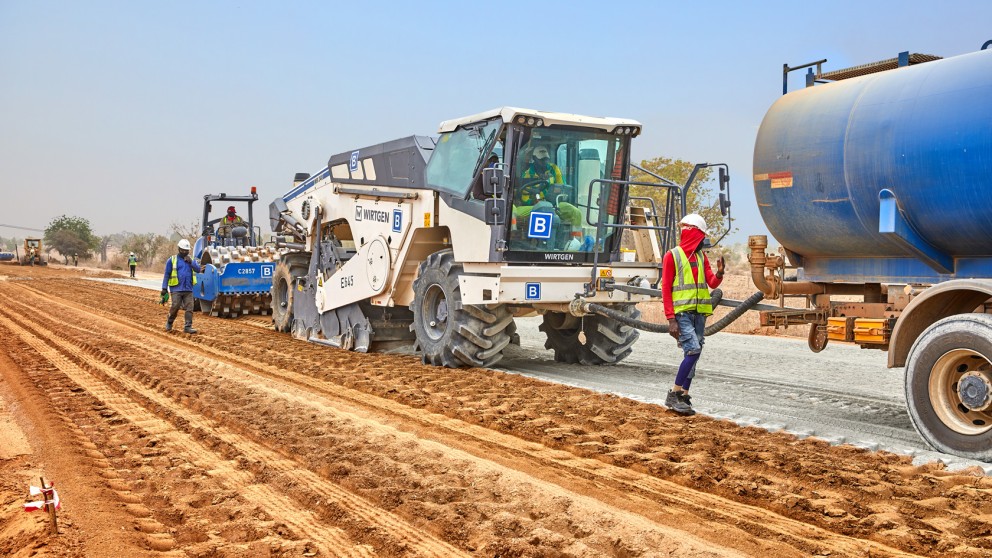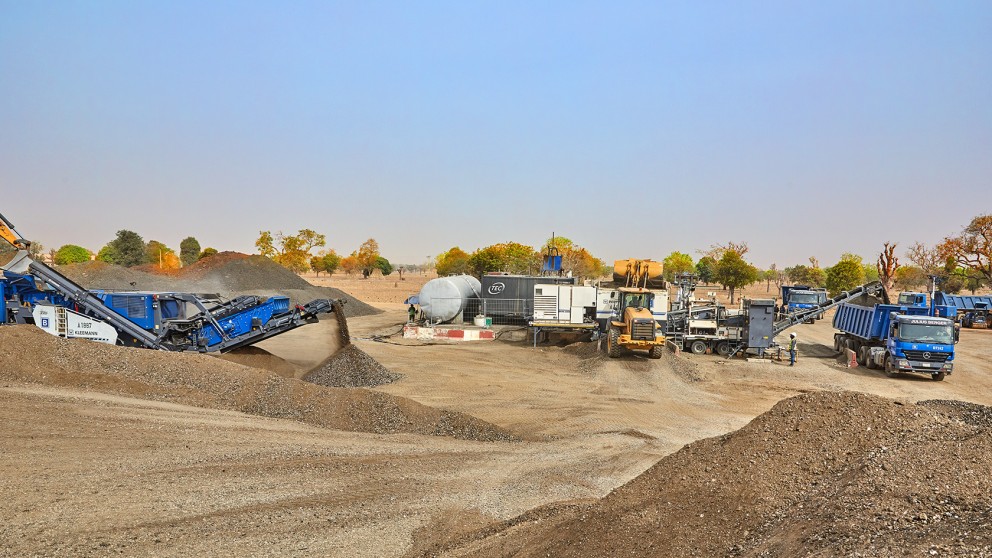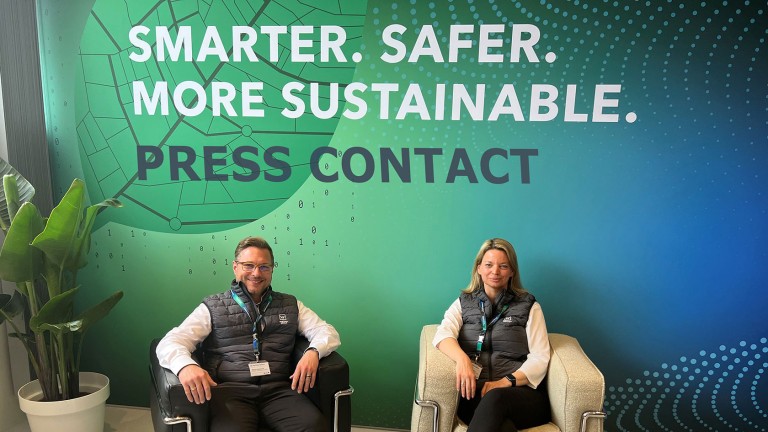A Milestone for Nigeria – the Wirtgen Group and JBN Realize a Showcase Project
Environmentally friendly reconstruction of 375 km of road with the cold recycling method
The Nigerian Federal Ministry of Works and Housing extended the scope of the contract agreed with Julius Berger Nigeria Plc (JBN) from rehabilitation to reconstruction of the A2 highway. The route connects the capital city Abuja in central Nigeria with Kano, in the north of the country. Instead of the ad hoc rehabilitation performed up to now, the project now foresees the complete reconstruction of all lanes and the hard shoulders.
A Project of Enormous Economic Relevance
The reconstruction of the Abuja-Kaduna-Zaria-Kano Road (AKR) is a part of “Trans-African Highways”, a network comprising transcontinental road construction projects in Africa. The aim is the stimulation of the African economy through the construction of a well-developed network of road-based trade corridors. For example, by establishing better connections between the economically weaker regions of the north and the economically stronger southern regions.

The Wirtgen soil stabilizers homogeneously mix the previously distributed cement into the road bed at the required depth. Regulated by the speed of the machine, a spray bar automatically adds the required amount of water to the cement.
Eco-Friendly Technologies in Demand
Nigeria, Africa’s largest economy, attaches increasing importance to the utilization of environmentally friendly technologies in the development of its infrastructure. From the beginning, the environmentally friendly cold recycling method was considered as an alternative to conventional road construction methods. The proposed use of this method was one of the factors that led to JBN winning the contract. The completion of the reconstruction project is scheduled for Q2/2023, and the completion deadline for special structures is set for early May 2024. Despite the tight schedule, JBN is optimistic that the project can be realized as planned, thanks to the time saved by the cold in-plant recycling method.
Cold Recycling with Foamed Bitumen – an Innovation in the Nigerian Road Construction Sector
Depending on the application, the cold recycling process involves mixing foamed bitumen into the existing construction materials “in-place”, namely with an in situ cold recycler, or “in-plant”, with a mobile cold recycling mixing plant located close to the construction site. In the case of this mammoth project with a traveling construction site, the contractor decided that the “in-plant” method would be the best option. The newly produced bituminous mix is known as BSM (bitumen-stabilized material). After paving and subsequent compaction, BSM is characterized by long-term durability and high load bearing properties. Viewed from a long-term perspective, BSM has other advantages: the foamed bitumen which is mixed in leads to selective adhesion within the cold recycling layer and thus prevents cracking. As part of the pavement structure, the permanent layers prepared in this way form an ideal foundation for final asphalt surfacing with considerably reduced layer thicknesses or fewer layers.
Julius Berger has adopted this construction method as the best long-term solution and sees it as a real innovation in the Nigerian road construction sector: “Cold recycling enables optimal use of existing construction materials and conserves valuable resources. This is why we are the first construction company in Nigeria committed to exploiting the full potential of this technology for our company and our clients,” explains Project Director Benjamin Bott.

An ideally coordinated team: The Kleemann MOBIREX MR 110Z EVO2 impact crusher reduces the milled material to the required grain size. Parallel to this, the KMA 220 processes crushed milled material to a new mix and loads it directly onto trucks.
Further expansion of the fleet of Wirtgen Group machines
Two complete cold recycling and paving fleets with a total of 45 machines had already been ordered at the start of the project. These included large milling machines and soil stabilizers from Wirtgen, cold recyclers and spreaders from Streumaster, Kleemann mobile impact crushers and Wirtgen cold mixing plants, Vögele asphalt pavers and mobile feeders and rollers from Hamm. 30 more machines were shipped to Nigeria in the course of the fleet expansion, “because we have been convinced by the efficiency and durability of the machines in the past. On top of this, we had the outstanding aftersales service here in Nigeria. This plays a major role in maintaining high machine availability, and is essential for assuring the smooth running of mega-projects like this,” says Bott.
Cost-Effective Construction Methods Ensure Low Life-Cycle Costs of the AKR
The work continued with an outstandingly low carbon footprint, even after the expansion of the project. In this sense, the benefits of the method lie primarily in the enormous potentials for saving energy in materials processing. As there is no need to dry or heat the base materials, fuel consumption can be reduced by 10 to 12 liters per ton in comparison with conventional rehabilitation techniques. The almost complete recycling of the surface layer corresponds to a reduction of construction material trucking needs by up to 90%. At the same time, 90% of the costs for resources and 100% of material disposal costs can be saved.
This results in a significant reduction in fuel consumption and lower CO₂ emissions. Above all, the cold recycling method also enables savings of up to 50% of the binding agents required – which is and remains the largest cost factor in road rehabilitation projects. Thanks to the special properties of BSM, cold recycling technology leads to extremely low costs throughout the service life of roads – as is the case with the Abuja-Kaduna-Zaria Road in Nigeria.

Public Relations
Reinhard-Wirtgen-Straße 2
53578 Windhagen
Germany

